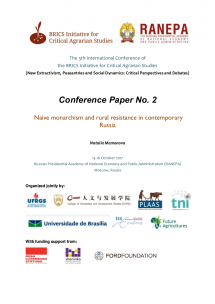Naive monarchism and rural resistance in contemporary Russia
This paper analyses the relation between “naive monarchism” and rural resistance in contemporary Russia. It argues that popular resistance in the name of the president is a form of contention of powerless groups in an authoritarian state.

Autores
The naive monarchist grievances of the rural population reinforce the presidential autonomy and hegemonic structure, and, therefore, are not subject to state repressions. At the same time, they provide the rural poor with a tool to tackle deprivation and inequality in the countryside. This raises the question of how “naive” the naive monarchism actually is. This research analyses three types of rural monarchist practices: written petitions, peasant delegations to the president, and geographical renaming in honour of Putin. Certainly, not all these acts are determined by strategic choices. Rural beliefs in a compassionate and impartial ruler have developed throughout peasant history, are culturally accepted, and popularised by the Putin government. The naive monarchist practices have been criticised for their backwardness and blank subjection to the power, but they are, perhaps, the most effective form of rural resistance in contemporary Russia. These dissents are unable to challenge the existing order at large, but provide rural dwellers with a means to remedy occasional local injustices.
